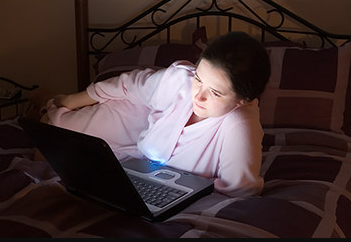New Year's Series: Are You a Doomscroller?

Are you a “doomscroller?”
You grab your phone for a quick social media check or to browse the latest headlines. And before you know it, you’re immersed in the worst news of the day. Spending hours on things like crime stats, COVID-19 numbers, and political turmoil.
You may want to stop consuming so much negative news, but it’s important to stay informed. And again you find yourself online — repeating the same pattern.
Health experts are using a new term for being drawn to disaster online: doomscrolling.
And too much of this behavior can take a serious toll on your mental and physical health.
What’s the harm in Doomscrolling?

The intense emotions doomscrolling brings can make it more difficult to eat, sleep, and focus on normal daily activities. This is especially true if you start obsessing over negative news first thing in the morning.
A constant state of anxiety and stress throughout the day can release hormones like cortisol and adrenaline into your body. And we know chronically high stress levels are often associated with conditions like heart disease, obesity, and diabetes.
So what can be done?
Breaking the doomscrolling habit isn’t easy, but there are a few ways you can become more mindful of your media consumption.
How to stop Doomscrolling

The solution isn’t to ignore important news or disable your Internet. Instead, rein in the negativity with these healthy tips:
- Track your time online. Use an app or a paper log to note exactly how long you’re on your screens and where you’re spending those hours. Ask yourself if the results align with what you find most meaningful.
- Set a schedule. Don’t keep social media and news sites open all the time. Instead, designate specific times during the day to read the news or check your feeds. Avoiding screentime at least one hour before bed has also been shown to improve sleep.
- Avoid alerts. Turn off notifications and keep your apps on silent. Try consuming some news via traditional offline outlets instead.
- Clean your feed. Notice which people and sites make you feel the most anxious or sad. Mute, unfollow, or stay away. Instead, seek out communities or causes that inspire joy and connection. This might be an online group related to a hobby or culture, or an app to communicate with faraway friends.
- Offset screen time. Balance the time you spend on social media with offline activities to reduce stress. These include getting together with friends, walking on a trail, or practicing deep breathing exercises.
- Give thanks. Gratitude has been shown to improve mood and increase resilience. Use your feeds to post daily lists of positive experiences. Or spread joy by, for instance, leaving positive online restaurant reviews.
Once you become more mindful of your habit, you can start to find a more positive and meaningful online experience.
“It's just as important to fill our minds with positivity as it is to put good food into our bodies,” said Terri LaCroix-Kelty, MSW, Director of Munson Medical Center’s Behavioral Health Services. “Instead of training our brains to see the negative, we can train our brains to focus on positivity. This makes us feel more positive, which makes us think more positive, and on the cycle of feeling good goes.”
When to Seek Additional Help

Constant fear and anxiety can have a dramatic impact on your mental and physical health. If doomscrolling is still taking a toll even after trying the tactics above, you may need a professional to lend a hand.
Speak with your primary care provider about the emotions you’re feeling and how they’re impacting your daily activities. Things like work, sleep, and how you interact with friends and family.
Make sure to understand what help is available – including free and no-insurance options – and what treatment options may help you move forward. Munson Healthcare’s free Resilience Toolkit is also loaded with helpful resources.
Unsure? Ask-a-Nurse

If you don’t have a primary care provider, or you’re unsure what to do about your habit, call Munson Healthcare Ask-A-Nurse at 231-935-0951. Registered nurses are available 24 hours a day to share available resources.